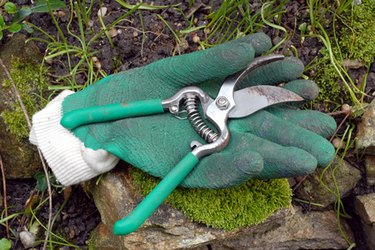Things You'll Need
Lawn mower
Fertilizer
Water
Gloves
Pruners
Glyphosate herbicide
Garden sprayer

On steep slopes that are difficult to mow, or in areas where grass won't grow, Asian or Asiatic Jasmine, also known as Jasmine Minima, is an ideal alternative. With deep green color and low-growing form, it creates a lush ground cover. Asian Jasmine has tiny leaves that grow on woody stems and, compared to grass, is low maintenance. When it's well established, weeds are not a significant problem in Asian Jasmine. When they do appear, be prepared with some simple strategies.
Step 1
Water Asian Jasmine monthly during extreme droughts; otherwise, rely on normal rainfall. Apply 1 pound of nitrogen per 1,000 square feet two or three times yearly until Asian Jasmine is well established; afterward, fertilize once yearly in early spring. Mow at a height of 3 or 4 inches in late winter to promote air circulation and discourage disease in Asian Jasmine. This proper care will prompt Asian Jasmine to form a dense mat that will discourage the growth of weeds.
Video of the Day
Step 2
Pull young weeds by hand as soon as they appear in Asian Jasmine to prevent them from gaining a foothold and multiplying. A good pair of garden gloves are a necessity for this chore, and a pair of hand pruners are helpful for removing tree seedlings.
Step 3
Spray Asian Jasmine with a garden sprayer filled with a glyphosate herbicide (such as Roundup) mixed according to package directions. Glyphosate is not effective against woody plants such as Asian Jasmine, although it will likely burn any young, tender foliage. It will however, kill the weeds growing within the Asian Jasmine. If you're concerned about harming the Asian Jasmine, test spray a small area that contains weeds and wait a day or two to see the results before continuing.
Video of the Day